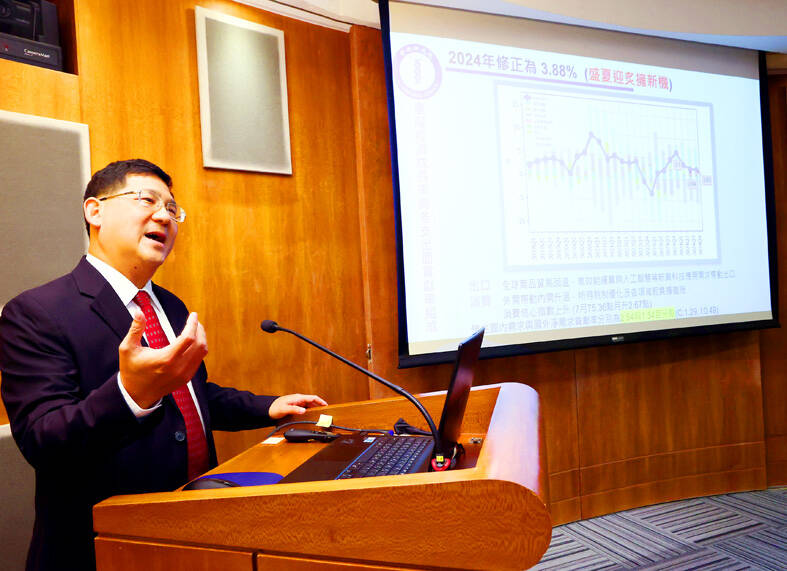The economy last quarter expanded 5.09 percent annually, missing the government’s May forecast by 0.09 percentage points, as exports did not fare as well as expected, the Directorate-General of Budget, Accounting and Statistics (DGBAS) said yesterday.
Exports of goods and services grew 7.87 percent year-on-year in the second quarter, 3.35 percentage points less than the agency’s May estimate, DGBAS official Wang Tsui-hua (王翠華) said.
The data suggested that GDP growth for the whole of this year could be 3.91 percent, less than the 3.94 percent previously projected if other categories hold steady, she said.

Photo: CNA
The DGBAS is to provide an official update later this month.
On a positive note, outbound shipments grew 9.91 percent in US dollar terms, propelled by robust global demand for electronics used in high-performance computing, artificial intelligence (AI), smartphones, laptops, wearables and vehicles, the DGBAS said.
In all, net exports turned negative for the first time in a year and took out 0.39 percentage points from second-quarter GDP growth after factoring in a faster 10.62 percent gain in imports, Wang said.
Capital formation, the main drag on growth over the past few years, posted a robust 15.34 percent increase, beating the forecast by 10.49 percentage points and adding 3.87 percentage points to GDP, Wang said.
The impressive results came after imports of capital equipment rose 15.92 percent, the best performance in 11 quarters, as local firms bought machinery equipment to upgrade and expand their facilities to meet customer demand, Wang said, citing chipmaker Taiwan Semiconductor Manufacturing Co (台積電) and chip tester ASE Technology Holding Co (日月光投控) as examples.
Private consumption rose 2.71 percent due to wage hikes and rallies on the TAIEX, among other things, the DGBAS said.
Separately, Academia Sinica projected GDP growth of 3.88 percent for this year, which was more conservative than the DGBAS’ estimate, but was up 0.86 percentage points from its previous forecast.
The upward revision was due to robust exports amid growing demand for advanced technologies such as high-performance computing and AI, said Lin Chang-ching (林長青), an adjunct research fellow with Academia Sinica’s Institute of Economics.
The institute projected a 2.62 percent increase in private consumption for this year based on a stable job market, active stock market trading, and robust cross-border and business travel.
However, typhoons, salary increases in the public sector, and rising electricity and housing costs could all contribute to inflationary pressures, leading the institute to predict a 2.21 percent increase in consumer prices for this year.
The institute called on the government to monitor inflationary pressures.
An internal survey conducted by Academia Sinica found that 64 percent of Taiwanese expect their cost of living to increase from last year.

Semiconductor business between Taiwan and the US is a “win-win” model for both sides given the high level of complementarity, the government said yesterday responding to tariff threats from US President Donald Trump. Home to the world’s largest contract chipmaker, Taiwan Semiconductor Manufacturing Co (TSMC, 台積電), Taiwan is a key link in the global technology supply chain for companies such as Apple Inc and Nvidia Corp. Trump said on Monday he plans to impose tariffs on imported chips, pharmaceuticals and steel in an effort to get the producers to make them in the US. “Taiwan and the US semiconductor and other technology industries

A start-up in Mexico is trying to help get a handle on one coastal city’s plastic waste problem by converting it into gasoline, diesel and other fuels. With less than 10 percent of the world’s plastics being recycled, Petgas’ idea is that rather than letting discarded plastic become waste, it can become productive again as fuel. Petgas developed a machine in the port city of Boca del Rio that uses pyrolysis, a thermodynamic process that heats plastics in the absence of oxygen, breaking it down to produce gasoline, diesel, kerosene, paraffin and coke. Petgas chief technology officer Carlos Parraguirre Diaz said that in

SMALL AND EFFICIENT: The Chinese AI app’s initial success has spurred worries in the US that its tech giants’ massive AI spending needs re-evaluation, a market strategist said Chinese artificial intelligence (AI) start-up DeepSeek’s (深度求索) eponymous AI assistant rocketed to the top of Apple Inc’s iPhone download charts, stirring doubts in Silicon Valley about the strength of the US’ technological dominance. The app’s underlying AI model is widely seen as competitive with OpenAI and Meta Platforms Inc’s latest. Its claim that it cost much less to train and develop triggered share moves across Asia’s supply chain. Chinese tech firms linked to DeepSeek, such as Iflytek Co (科大訊飛), surged yesterday, while chipmaking tool makers like Advantest Corp slumped on the potential threat to demand for Nvidia Corp’s AI accelerators. US stock

SUBSIDIES: The nominee for commerce secretary indicated the Trump administration wants to put its stamp on the plan, but not unravel it entirely US President Donald Trump’s pick to lead the agency in charge of a US$52 billion semiconductor subsidy program declined to give it unqualified support, raising questions about the disbursement of funds to companies like Intel Corp and Taiwan Semiconductor Manufacturing Co (台積電). “I can’t say that I can honor something I haven’t read,” Howard Lutnick, Trump’s nominee for commerce secretary, said of the binding CHIPS and Science Act awards in a confirmation hearing on Wednesday. “To the extent monies have been disbursed, I would commit to rigorously enforcing documents that have been signed by those companies to make sure we get